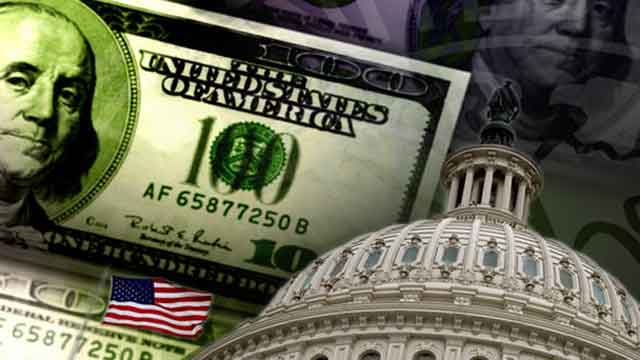Fox News poll: Majority against raising debt ceiling
Voters say debt limit should only be raised after major spending cuts
Soon Congress will have to vote on raising the nation’s debt limit so the federal government can borrow more money to make good on its spending commitments. If it were up to the American public, they would vote no -- with a majority saying the debt limit should only be raised after major spending cuts have been made.
A Fox News national poll asks voters to imagine being a lawmaker and having to cast an up-or-down vote on raising the debt ceiling: 37 percent would vote in favor of it, while 58 percent would vote against it.
Treasury Secretary Jack Lew has said the country will be unable to meet its commitments starting October 17.
Most Republicans (78 percent) and a majority of independents (57 percent) would vote against raising the limit. So would almost all Tea Partiers (88 percent).
Click here for the poll results.
More than half of Democrats would vote in favor of increasing the debt ceiling (57 percent), while 38 percent would vote against doing so.
At the same time, 62 percent of voters want Congress to raise the limit only after agreeing on “major cuts in government spending.” Far fewer -- 27 percent -- believe the limit must be increased and that is it “reckless” to even debate not doing so.
Even Democrats, by a 48-42 percent margin, are more likely to say spending cuts must accompany an increase in the debt limit.
By wide margins Republicans (77-11 percent) and independents (65-26 percent) would require cuts in government spending before agreeing to raise the debt ceiling.
Meanwhile, by a nine percentage-point margin, voters are likely to think the automatic government spending cuts that went into effect March 1 are more a good thing than a bad thing (48-39 percent). That’s mostly unchanged from how voters felt about the sequester cuts earlier this year.
Republicans (63 percent) are nearly twice as likely as Democrats (32 percent) to say the cuts are a good thing. More than half of independents (53 percent) agree, as do three-quarters of Tea Partiers (76 percent).
The Fox News poll is based on landline and cellphone interviews with 952 randomly chosen registered voters nationwide and was conducted under the joint direction of Anderson Robbins Research (D) and Shaw & Company Research (R) from October 1-2, 2013. The full poll has a margin of sampling error of plus or minus three percentage points.





















